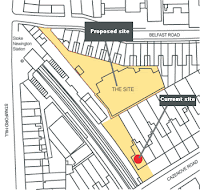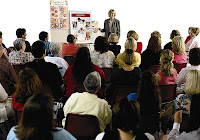Keeping the Faith
 As the government announces that schools should have the right to ban the Muslim veil, Harriet Shawcross visits a Hackney primary school that is proving the importance of keeping the faith.
As the government announces that schools should have the right to ban the Muslim veil, Harriet Shawcross visits a Hackney primary school that is proving the importance of keeping the faith.
There is a religious resurgence taking place in Hackney. On this bitterly cold March morning a Jehovah’s witness is handing out The Watchtower, as a rabbi whistles past on his bicycle, ringlets flying. An imam in floor length robes and a duffel coat emerges from the newsagent, only to be overtaken by hundreds of Muslim boys streaming noisily towards a smart semi-detached house.
“Stand back,” warns Mohammed Adia, as the boys crowd through the doorway. “There’s not much room.” This is Tawhid Boys School in Stoke Newington, a fee-paying Muslim school of 100 pupils. Life at the school is cramped: there is no library, canteen, or IT facilities, and teaching takes place in the converted bedrooms of a Victorian terraced house.
The battle for more space has been a long one. After six years of faltering negotiations, last month the council agreed to re-start talks over the purchase of new premises on Belfast Road, behind the existing Stoke Newington site. Mohammed Adia, chief pastor at the school, is overjoyed: “Imagine what we could do,” he says, gesturing wildly towards the window. “This is a wonderful decision.”
The expansion is long overdue: there are 218 boys on the waiting list for Tawhid, and no way of squeezing them into the already over-crowded classrooms. But the extension has not been universally applauded, and many fear that the expansion of faith schools like Tawhid will breed nothing but division, fundamentalism and insularity.
Terry Sanderson, president of the National Secular Society, is a vociferous opponent of faith schools. “This is the last thing we need,” he sighs. “Schools like this encourage splits and divisions in the community. Children from different backgrounds need to get to know each other on a day to day basis from an early age. Once the barriers of suspicion between communities have developed it is very hard to break them down. Faith schools emphasise the differences between communities,” he continues, “rather than showing them what they have in common. The expansion of faith schools is a disaster waiting to happen.”
And yet inside Tawhid there is not a whiff of insularity. Colourful displays about Shakespeare’s Globe and mosques in Somalia compete for wall space, and Turkish, Urdu, Somali, English and Arabic can be heard across the playground. The school itself is also situated in the heart of an orthodox Jewish community. “It’s like the West Bank in London,” Mr Adia jokes. “Only there’s no hostility here. We play football against Simon Marx [a Jewish primary school] up the road. It’s no problem.” He is keen to point out that his students are not cloistered away from the community. “People see us,” he says. “We go to the mosque to pray everyday, and whenever the boys go to the corner shop I tell them: be nice, say please and thank you. You never know,” he continues, “maybe one day someone will notice their good behaviour, and might want to learn more about Islam.”
Given the overwhelmingly Jewish population of Cazenove Road, this seems like wishful thinking. But the local community has supported the school’s bid for expansion wholeheartedly. “They’re lovely people,” says local rabbi and Lib Dem Councillor Joseph Strauber. “They deserve to run their own school. People are always playing on the differences between Judaism and Islam, but I say we’re both brothers of Abraham, or maybe cousins, once removed. The fact is we want the same things. A Muslim once told me; ‘We choose to live here because your children will not corrupt our children.’ I think that’s very true. We are both looking for a moral education for our young.”
Mr Adia prides himself on the moral instruction at Tawhid. Although the school’s academic record is not impressive, with only 55 per cent of pupils achieving five GCSEs at grades A-C, he believes the moral curriculum is second to none. “What we are trying to do here,” he says, “Is teach the boys to treat each other like human beings; living people created by God. We try to teach them Muslim values like forgiveness, modesty and respect for women. There has been a real deterioration in education in this country. Discipline is missing, respect for parents is not there. We are trying to bring these things back.”
But Dr Neil Burtonwood, a senior lecturer in Education at Leeds University, believes there is a sinister side to this moral instruction. “It is certainly possible that faith-based schooling will encourage the growth of sub-national identities,” he says. He believes that by teaching children Muslim values, and only employing Muslim staff, schools like Tawhid run the risk of creating an insular student base, who consider themselves Muslim rather than British. This process is exacerbated by the demonisation of the Muslim community in the tabloid press. “Under conditions of stigmatisation communities will look inwards for security and identity. Faith schools are part of that.”
At the mention of Muslim identity Mr Adia raises his hands to heaven: “I’m born and bred in Hackney,” he says, “I’m not from Afghanistan; I went to Hackney Downs School. I’m a British citizen, and I’m proud to be British - but what’s so wrong with being Muslim? The situation here is getting worse and worse. Just last month my cousin had her veil pulled off her head on the bus.” He sighs: “Everyone should have the right to practice their religion. In many countries Muslims are denied that. But that is what’s so wonderful about Britain - we have freedom of religion. It’s about time people started standing up for that.”
Copyright of The Hackney Post



